|
|
|
Sort Order |
|
|
|
Items / Page
|
|
|
|
|
|
|
| Srl | Item |
| 1 |
ID:
049919
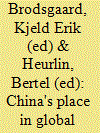

|
|
|
|
|
| Publication |
London, Routledge Curzon, 2002.
|
| Description |
ix, 205p.
|
| Standard Number |
0700715320
|
|
|
|
|
|
|
|
|
|
|
|
Copies: C:1/I:0,R:0,Q:0
Circulation
| Accession# | Call# | Current Location | Status | Policy | Location |
| 045877 | 327.1010951/BRO 045877 | Main | On Shelf | General | |
|
|
|
|
| 2 |
ID:
068044
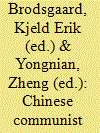

|
|
|
|
|
| Publication |
London, Routledge, 2006.
|
| Description |
ix, 268p.
|
| Series |
Routledge studies on the Chinese economy
|
| Standard Number |
0415374774
|
|
|
|
|
|
|
|
|
|
|
|
Copies: C:1/I:0,R:0,Q:0
Circulation
| Accession# | Call# | Current Location | Status | Policy | Location |
| 050907 | 324.251075/BRO 050907 | Main | On Shelf | General | |
|
|
|
|
| 3 |
ID:
135104
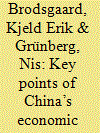

|
|
|
|
|
| Summary/Abstract |
At the Third Plenum held in November 2013, the Communist Party of China (CPC) adopted a comprehensive reform programme containing no less than 300 reform proposals. It is potentially the most important reform document to have been passed by the CPC since the landmark Third Plenum in December 1978. Entitled ‘The Decision of the CPC Central Committee on Some Important Questions Concerning Comprehensively Deepening Reform’, the programme upgrades the role of the market in the general economic system from ‘basic’ to ‘decisive’. It also stipulates a number of reform measures within finance, banking, tax, real estate, hukou, urbanisation, government administration, family planning, etc., and establishes two new important leading bodies. One is The Central Leading Group on Comprehensively Deepening Reform and the other is the National Security Council. Xi Jinping is named chairman of both of these new powerful institutions. This indicates his increasingly dominant role in Chinese politics. The reform programme aims to create a more open and market-regulated Chinese economy by 2020, although without dismantling the guiding role of the state-owned economy. The article argues that implementation of the new ambitious goals will be met by resistance from entrenched vested interests. In the state-owned enterprise (SOE) sector powerful actors and interests will try to preserve the status quo. Some private investment will be allowed in publicly-owned entities in order to create enterprises characterised by mixed ownership. However, in key sectors of the economy SOEs will still enjoy a monopoly and will not be exposed to free market competition.
Banks and Finance
|
|
|
|
|
|
|
|
|
|
|
|
|
|
|
|
| 4 |
ID:
119180
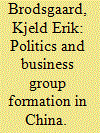

|
|
|
|
|
| Publication |
2012.
|
| Summary/Abstract |
As a result of economic reform and administrative restructuring in China, a number of powerful state-owned business groups ("national champions") have emerged within sectors of strategic importance. They are headed by a new corporate elite which enjoys unprecedentedly high levels of remuneration and managerial independence from government agencies and which derives legitimacy from symbolizing China's economic rise. However, through the nomenklatura system, the Party controls the appointment of the CEOs and presidents of the most important of these enterprises and manages a cadre transfer system which makes it possible to transfer/rotate business leaders to take up positions in state and Party agencies. In order to conceptualize the coexistence of the contradicting forces for further enterprise autonomy and continued central control that characterizes the evolving relationship between business groups and the Party-state, this paper proposes the notion of integrated fragmentation.
|
|
|
|
|
|
|
|
|
|
|
|
|
|
|
|
| 5 |
ID:
094705
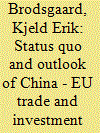

|
|
|
|
|
|
|
|